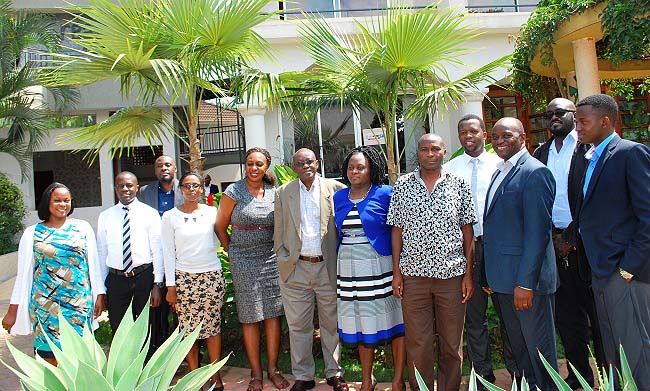Makerere University College of Agricultural and Environmental Sciences (CAES) in partnership with the Ministry of Agriculture Animal Industry and Fisheries (MAAIF), on 30th August 2018 held Uganda’s action planning meeting to assess the implementation of the Malabo declaration.
The Malabo declaration was adopted during the 23rd Ordinary Session of the African Union (AU) Assembly in Malabo, Equatorial Guinea, held from 26th to 27th June 2014. It was aimed at accelerating agricultural growth and transformation for shared prosperity and improved livelihoods mostly centred on small scale farmers’ agriculture.
During that meeting the AU Heads of State and Government adopted the Malabo declaration and committed to ending hunger by 2025 and to achieve this, they resolved to halve the current levels of post-harvest losses by the year 2025.
The declaration required that most of the African countries contribute at least 10% of their national budget towards Agriculture and since that time there have been follow-ups to see which countries have fulfilled the Malabo declaration through the Comprehensive African Agriculture Development Program (CAADP).

According to Prof. Archileo Kaaya; coordinator Uganda Food Agriculture and Natural Resources Policy Analysis Network (FANAPAN) Uganda Node, CAADP is Africa's policy framework for agricultural transformation, wealth creation, food security and nutrition, economic growth and prosperity for all.
FANAPAN is a multi-stakeholder network which supports the development of policies regarding food, agriculture and natural resources. It was established in 1987 by a group of Ministers from AU and is currently based in Pretoria, South Africa.
During the meeting held at Fairway Hotel, Prof. Kaaya also the Head, Department of Food Technology, Nutrition and Bioengineering explained that FANPAN has been writing proposals for support to agriculture and one of these was specifically aimed at addressing issues of the Malabo declaration.
“FANPAN got a grant from the African Green Revolution to establish dialogues, for finding the country’s position in line with fulfilling the Malabo CAADP declaration.

In order for each country to check its progress in fulfilling the Malabo declaration, they come up with an action plan which has thematic areas that the country promised to fulfill” he said.
The FANPAN funded meeting at Fairway Hotel attracted different Agricultural stakeholders like non-state actors, Makerere University staff, Local Governments and the private sector among others. It was aimed at identifying the gaps in the CAADP ahead of the Kigali-Rwanda meeting of which seven of Uganda’s commitments were identified as needing improvement.
They include; Re-committing to the CAADP process, Enhancing investment finance in Agriculture, Ending hunger by 2025, Halving poverty through Agriculture by 2025, Boosting intra-African Trade in Agriculture commodities and Enhancing resilience to climate change variability.
Prof. Kaaya noted that the Kigali meeting will gather all countries that make up the AU and each country will present their action plan in as far as implementing the CAADP is concerned.

“The ministry of Agriculture identified stunting, malnourishment; poverty and hunger reduction, climate change resilience, and environmental management as still very big problems, “he said.
He explained that each of the thematic areas which the country promised to fulfill has also got subthemes with activities that also have to be fulfilled.
“Looking at where we are doing badly according to the action plan, we want to see what budget can be attached to those areas to enhance development.
We want to see what technical support is needed to address the action problem, be it in the area of supporting technologies, what technical support is needed in developing the technology to address issues of post harvest losses, issues of storage and drying among others,” he said.

The theme for the Kigali forum is focusing on small holder farmers: “lead, measure, grow to enable new pathways to turn small holder farmers into future agri-businesses”.
According to Emmanuel Kimbowa, Senior Economist MAAIF, Uganda has not been performing well in fulfilling the Malabo declaration and yet agriculture is now a business that many smallholder farmers aspire to engage in.
He said that during the forum, AU countries’ presentations will be scored based on progress made in fulfilling the CAADP process. He added that Uganda can only fulfill this through a multi-sectoral approach.
“During our joint sector review, it was reported that the ranking was reduced to 39% but Uganda managed to score 45% yet we did not report on other areas. But if we embrace a multi-sectoral approach we can perform better, “he said.

Agnes Kirabo the Executive Director, Uganda Food Alliance, observed the need to engage the youth in whatever is done in Agriculture to enhance rapid growth.
“There are various opportunities for the youth in Agriculture and Value addition but we are currently not on track towards this objective because we have left them behind” she said.
Story compiled by Agnes Nankebe Nantambi,
For Communication Office, CAES


 General17 hours ago
General17 hours ago
 General16 hours ago
General16 hours ago
 Humanities & Social Sciences2 weeks ago
Humanities & Social Sciences2 weeks ago
 General1 week ago
General1 week ago
 Agriculture & Environment2 weeks ago
Agriculture & Environment2 weeks ago







